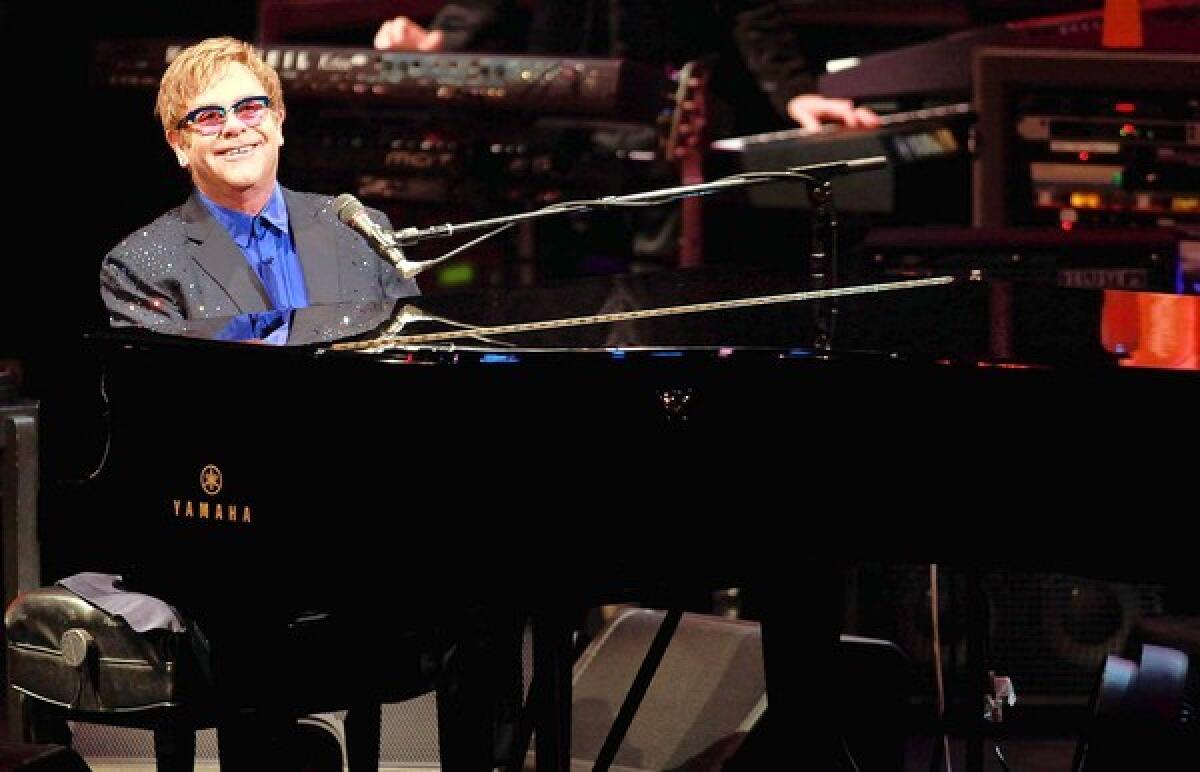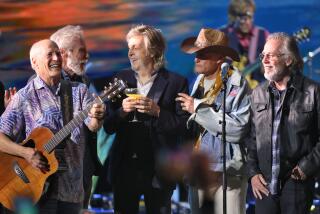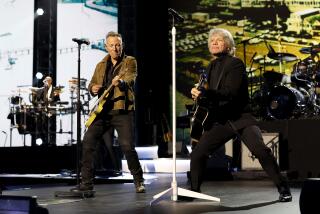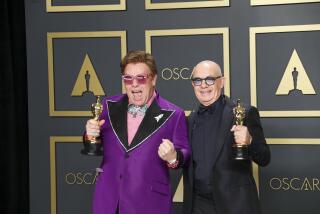Elton John finds ‘room to breathe’ on ‘The Diving Board’

On Oct. 25, 1975, Elton John played the first of two sold-out concerts at Dodger Stadium for a combined audience of 110,000 people. The gigs helped establish John as one of the most theatrical pop stars in the world: a piano-pounding dynamo prowling the stage in a bedazzled Dodgers uniform.
Last week, John was back in L.A., performing in a somewhat cozier, more decorous space: the 1,200-seat Bovard Auditorium at USC.
The show paired the English superstar with students from the Thornton School of Music for stately renditions of hits like “Levon” and “Your Song,” as well as a handful of thoughtful new tunes (including one about Oscar Wilde).
By John’s flamboyant standards, it was pretty sedate. But his voice was clear and powerful, booming through the auditorium with strength and precision.
“I think I’ve learned how to sing better every year, and I’ve been singing now for 40-something years,” he said before the concert in a trailer parked outside the Bovard. In a few hours he would change into a sparkly jacket, but for now he was wearing a black-and-white tracksuit as he sipped a cup of milky tea. “My voice and my piano playing are in the best shape and sound they’ve ever been in. And listen, if I can say that at 66 …” He trailed off, laughing with what seemed like a touch of incredulity.
That voice and piano are at the heart of “The Diving Board,” a new album due out Tuesday on which he returns to the bare-bones trio setting he hasn’t employed since the early ‘70s, when a six-night stand at the Troubadour — his first performances in the United States — led former Times pop music critic Robert Hilburn to open his review with one word: “Rejoice.”
Handsomely played and rich with the kind of detailed storytelling for which John’s longtime lyricist Bernie Taupin is known, “The Diving Board” shares something with classics such as “Tumbleweed Connection” and “Madman Across the Water.” But if it represents a throwback — the first single is called “Home Again” — the album also feels like John’s attempt to stand out in today’s hyperactive pop scene.
PHOTOS: Unexpected musical collaborations
“I’m not into clutter at the moment,” he said. “When you’ve got more room to breathe, you don’t have to shout above the noise.”
The record, which T Bone Burnett produced, follows “The Union,” John’s acclaimed 2010 collaboration with the singer-songwriter Leon Russell, whom he called one of his artistic idols. Not long after the release of that album, also overseen by Burnett, John and the producer were discussing options for their next project over lunch in L.A.
“And I said to Elton, ‘Why don’t we just do a trio record?’” Burnett recalled. He’d seen one of John’s legendary Troubadour shows and thought it might be time to try to recapture “the raw beauty of Elton’s piano playing.”
John agreed, and so Burnett quickly assembled a band — Jay Bellerose on drums and the neo-soul fixture Raphael Saadiq on bass — and the musicians began laying down tracks at a studio on the Westside. (In addition to maintaining homes in France, England and elsewhere, John and his partner David Furnish live part-time in L.A., where both of their young sons were born.)
Though he was using a method from his early days, John said the goal was an album “appropriate for my age,” meaning one with a minimum of the sort of showboating he once favored. As Burnett said, “A person looks silly trying to do things in his 50s and 60s that he would’ve done in his teens and 20s. It’s unbecoming.”
Emmys 2013 full coverage: Best & worst moments | Winners and top nominees | Red carpet arrivals
For others, perhaps, but not quite for John, who last year scored a No. 1 record in Britain with “Good Morning to the Night,” a set of sleek dance-pop remixes he made with the Australian duo Pnau.
Still, Burnett isn’t wrong when he says “The Diving Board” carries a whiff of the “fully grown-up music” Frank Sinatra was making in the mid to late 1950s on albums like “In the Wee Small Hours” and “Only the Lonely.” And it’s that “emotional honesty,” as John described it, that has the singer more excited about the new project than any he’s done in years, he said.
“When T Bone played me the album, the minute it was finished, my cellphone rang,” said Steve Barnett, head of John’s label, Capitol Records. “It was Elton, calling from Buenos Aires: ‘So what’d you think?’”
Of course, enthusiasm only gets one so far in a pop marketplace loaded with marquee fourth-quarter releases by the likes of Katy Perry and Justin Timberlake, not to mention fellow veterans such as Paul McCartney and Sting.
That competition for attention is one reason John has been beating a path lately on the promotional circuit. Following last week’s performance at USC (which was filmed), he played Friday night at the iHeartRadio Music Festival in Las Vegas, and Sunday he appeared on the Emmy Awards in a tribute to Liberace — all this not long after a summer in which he said he nearly died of appendicitis.
Asked if he feels like an outlier at an event like iHeartRadio, on a lineup otherwise long on fresh-faced stars, John laughed and said, “Well, McCartney’s doing it too,” then added, “We’ll both stick out like sore thumbs.”
Yet he said he couldn’t turn down a high-profile opportunity to perform some of the songs from “The Diving Board,” given that “they’re certainly not going to get played on the radio.”
The singer seems sanguine about his place in the hit parade he once dominated. “It’s other people’s turn,” he insisted in an onstage Q&A at the Bovard. Taupin thinks their diminished dependence on pop radio has effected a kind of creative liberation.
“We’re writing music now with no barriers,” the lyricist said. “We’re not kowtowing to any format, and I think that’s rejuvenated us.”
John was more blunt. “I don’t have to prove anything,” he said. “I’m not going out to be in the Top 40 anymore. There was a time when that was very enjoyable. But it’s a kind of relief when you can wear your own overcoat and not have to wear anyone else’s.”
More to Read
The biggest entertainment stories
Get our big stories about Hollywood, film, television, music, arts, culture and more right in your inbox as soon as they publish.
You may occasionally receive promotional content from the Los Angeles Times.







